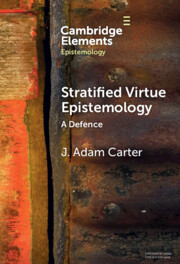Refine search
Actions for selected content:
3 results

Stratified Virtue Epistemology
- A Defence
-
- Published online:
- 12 December 2023
- Print publication:
- 18 January 2024
-
- Element
- Export citation
2 - Agents of Justice
-
- Book:
- Democratizing Global Justice
- Published online:
- 21 May 2021
- Print publication:
- 10 June 2021, pp 32-57
-
- Chapter
- Export citation
Chapter 4 - What Is Epistemic Entitlement?
-
-
- Book:
- Virtue Theoretic Epistemology
- Published online:
- 16 July 2020
- Print publication:
- 23 July 2020, pp 93-123
-
- Chapter
- Export citation
